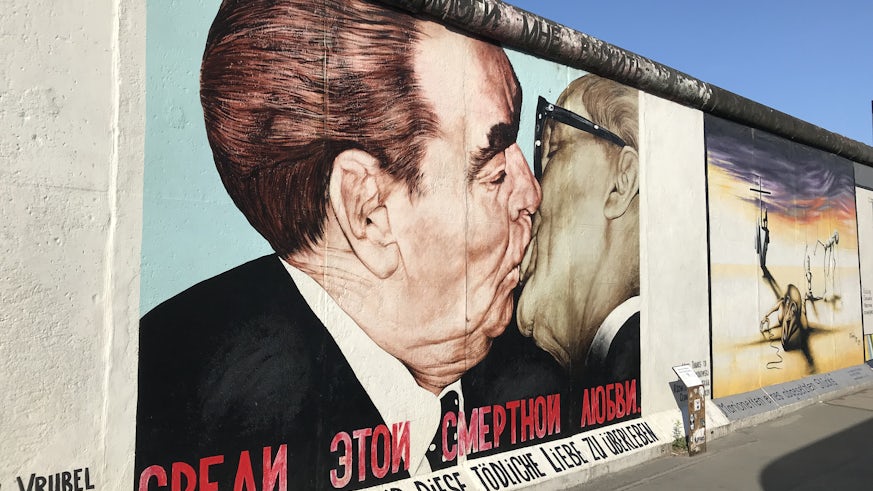Walls of hope
5 December 2018

Historian and eye witness to fall of Berlin Wall contributes to a new television series looking at some of the world’s most iconic walls.
Witnessing first hand iconic moments of world history is rare indeed. Just one such German student who witnessed the opening of Berlin’s Brandenburg Gate in 1989 is the historian Dr Marion Loeffler.
The Lecturer in Welsh History has switched one capital of Europe for another for the final programme in a new television series focussing some of the world’s most iconic walls.
Y Wal is looking at six of the world’s most divisive walls including the US and Mexico, Israel and Palestine, Korea, Cyprus and Northern Ireland. The series focuses on the communities living in the shadow of these walls, exploring the hope and unity of those facing division and separation.
Erected in 1961, to divide East from West Germany, the Berlin Wall came to signify the Iron Curtain between all of the ‘democratic’ West and the ‘Communist’ East during the Cold War.
Having grown up in the German Democratic Republic, and participating in the movement which brought down the Wall in 1989, Dr Loeffler experienced the ground-breaking political changes that led to German re-unification before moving to live in the UK in 1994.
In the last programme of this new series, she focuses on how nature provides a blueprint for the healing of political wounds. Since the Berlin Wall came down 29 years ago, she shares:
“Where there was a death-strip between two walls topped by razor wire, fields of wheat and trees grow again and cyclists cross what was once an almost impenetrable border between political blocks.”
An interview with her father allows us glimpses into every-day life in east Germany.
She adds: “My family history shows that a working-class childhood in East Germany could be idyllic, and that the StaSi did not control every family in the country.”
Having narrated the horrors of division and death surrounding iconic Walls, the last programme is imbued with hope:
“We must not forget the story of healing after political division. The history of Germany since 1989 shows that wounds close, families reunite, and scars may disappear when such symbols of division are finally dismantled” she adds.
Teaching at both undergraduate and postgraduate levels at Cardiff, Dr Marion Loeffler is particularly interested in the interplay of individual lives and politics, and the role of language and translation in the transfer of knowledge and concepts in the past and the present.
Y Wal runs on Sundays from 18 November. The Berlin programme airs on Sunday 16 December (also available on S4C Clic or BBC Iplayer).
